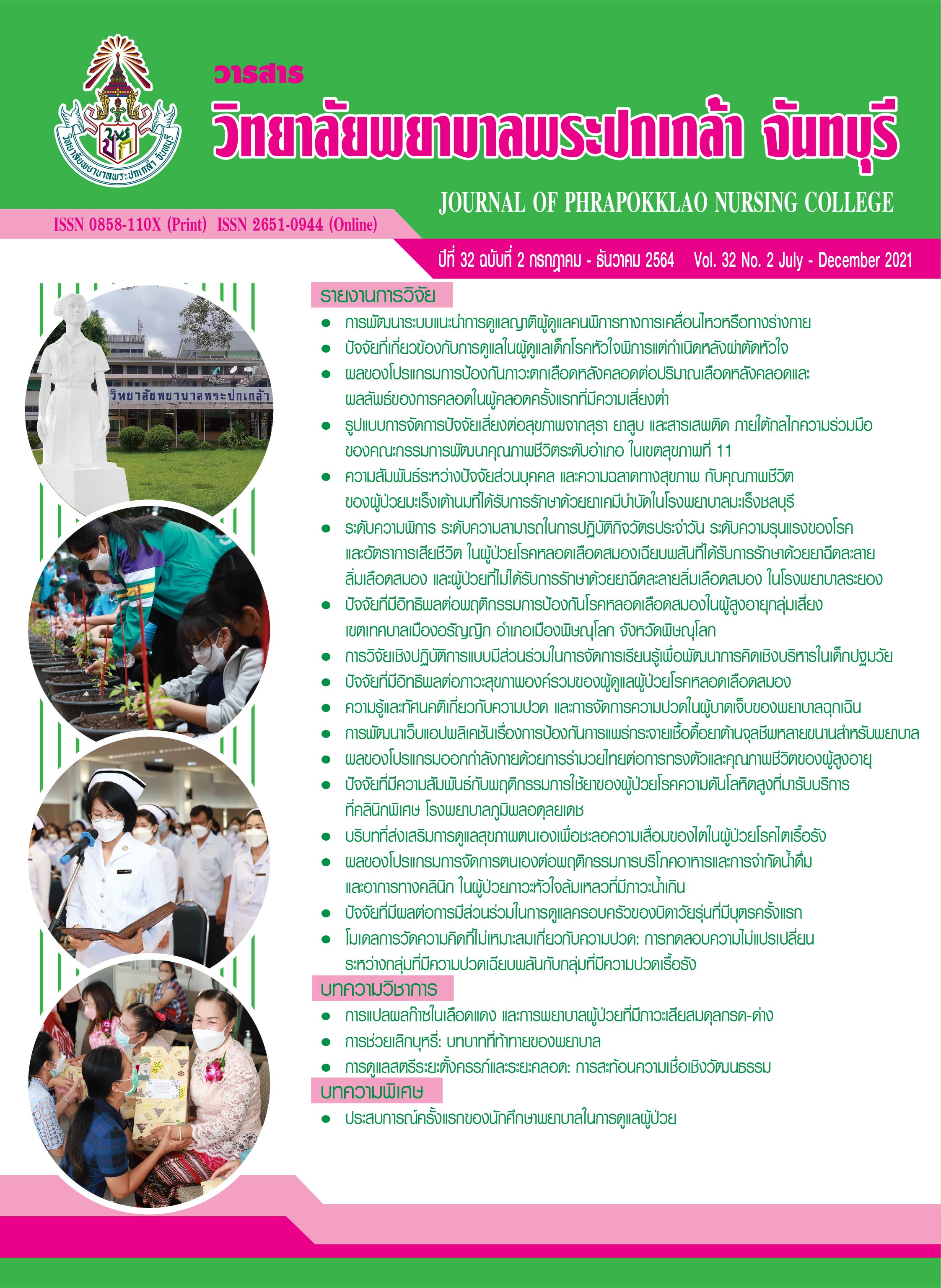Factors Related to Drug Compliance Behaviours among Hypertensive Patients Receiving Services at Special Clinic, Bhumibol Adulyadej Hospital
Keywords:
Drug compliance behaviours, Hypertensive patientsAbstract
This descriptive correlational research aimed to study drug compliance behaviours and factors related to drug compliance behaviours among hypertensive patients. The samples were 100 hypertensive patients who received services at special clinic, Bhumibol Adulyadej Hospital. The research instruments included the personal data questionnaire, the factors related to drug compliance behaviours questionnaires with reliability as .79, and the drug compliance behaviours of hypertensive patient questionnaire with reliability as .74. Data were collected from November, 2020 to March, 2021. Statistics used for data analysis included frequency, percentage, mean, standard deviation, and Spearman rank correlation.
The research results revealed that the total mean score of drug compliance behaviours among hypertensive patients was at a good level (M = 3.51, SD = .39). Factors positively statistically significant related to drug compliance behaviours among hypertensive patients were perceived benefits of drug compliance (rs = .353, p < .001), perceived severity of disease (rs = .283, p < .01), family support (rs = .249, p < .05), and public health staffs support (rs = .234, p < .05). In addition, factor negatively statistically significant related to drug compliance behaviours among hypertensive patients was perceived barriers of medication use (rs = -.294, p < .01).
This research suggests that health care providers should promote perceived benefits of drug compliance and perceived severity of disease as well as reduce perceived barriers of medication use among hypertensive patients. Hypertensive patients will improve their drug compliance behaviours.
References
กมลภู ถนอมสัตย์, และวิไล ตาปะสี. (2558). รูปแบบการปรับพฤติกรรมการใช้ยารักษาตามแผนการรักษาของผู้สูงอายุความดันโลหิตสูงในชุมชน. วารสารวิจัยเพื่อการพัฒนาเชิงพื้นที่, 7(2), 36–49.
ญาดา เรียมริมมะดัน, และพงษ์ณุวัฒน์ สมบัติภูธร. (2561). ปัจจัยที่มีความสัมพันธ์ต่อพฤติกรรมการรับประทานยาของผู้ป่วยโรคความดันโลหิตสูงในชุมชน อำเภอบ้านโพธิ์ จังหวัดฉะเชิงเทรา. วารสารการพยาบาล การสาธารณสุข และการศึกษา, 19(1), 132–144.
ณัชชา เจริญสรรพกิจ. (2563). ความสัมพันธ์ระหว่างแบบแผนความเชื่อด้านสุขภาพ การรับรู้อาการเตือน กับพฤติกรรมป้องกันโรคหลอดเลือดสมองในผู้ป่วยโรคความดันโลหิตสูง. วารสารระบบบริการปฐมภูมิและเวชศาสตร์ครอบครัว, 3(3), 46–58.
ทักษพล ธรรมรังสี. (2557). รายงานสถานการณ์โรค NCDs: วิกฤตสุขภาพ วิกฤตสังคม. กรุงเทพฯ: สำนักวิจัยนโยบายสร้างเสริมสุขภาพ. สืบค้นจาก http://www.ihppthaigov.net/DB/publication/attachbook/165/chapter1.pdf
ธวัชชัย วรพงศธร, และสุรีย์พันธุ์ วรพงศธร. (2561). การคำนวณขนาดตัวอย่างสำหรับงานวิจัย โดยใช้โปรแกรมสำเร็จรูป G*Power. วารสารการส่งเสริมสุขภาพและอนามัยสิ่งแวดล้อม, 41(2), 11–21.
แผนกเวชระเบียนและสถิติ โรงพยาบาลภูมิพลอดุลยเดช. (2563). สถิติผู้ป่วยโรคความดันโลหิตสูง ปี 2560–2562. กรุงเทพฯ: ผู้แต่ง.
วริศรา ปั่นทองหลาง, ปานจิต นามพลกรัง, และวินัฐ ดวงแสนจันทร์. (2561). ปัจจัยที่มีอิทธิพลต่อพฤติกรรมสุขภาพของผู้ป่วยโรคความดันโลหิตสูงที่ควบคุมไม่ได้. วารสารพยาบาลสงขลานครินทร์, 38(4), 152–165.
วิภาภรณ์ วังวรตระกูล, นันทวัน สุวรรณรูป, และกนกพร หมู่พยัคฆ์. (2560). ปัจจัยทำนายการรับประทานยาอย่างสม่ำเสมอต่อเนื่องในผู้ป่วยความดันโลหิตสูงชนิดไม่ทราบสาเหตุ. วารสารพยาบาลทหารบก, 18(1), 131–139.
ศศิธร รุ่งสว่าง. (2560). ปัจจัยที่มีความสัมพันธ์กับความร่วมมือในการใช้ยาหลายขนานของผู้สูงอายุโรคเรื้อรัง. วารสารพยาบาลศาสตร์ มหาวิทยาลัยสยาม, 18(35), 6–23.
สมลักษณ์ เทพสุริยานนท์. (2560). พฤติกรรมการรับประทานยาอย่างสม่ำเสมอของผู้ป่วยโรคความดันโลหิตสูงวัยผู้ใหญ่. วารสารพยาบาลทหารบก, 18(3), 115–122.
สมาคมความดันโลหิตสูงแห่งประเทศไทย. (2562). แนวทางการรักษาโรคความดันโลหิตสูงในเวชปฏิบัติทั่วไป พ.ศ. 2562. เชียงใหม่: ทริค ธิงค์. สืบค้นจาก http://www.thaihypertension.org/files/HT%20guideline%202019.with%20watermark.pdf
สำนักโรคไม่ติดต่อ กรมควบคุมโรค. (2563). รายงานสถานการณ์โรคไม่ติดต่อ (NCDs) พ.ศ. 2562. กรุงเทพฯ: อักษรกราฟฟิค แอนด์ ดีไซน์.
Becker, M. H. (1974). The health belief model and sick role behavior. Health Education Monographs, 2(4), 409–419. doi:10.1177/109019817400200407
Maiman, L. A., & Becker, M. H. (1974). The health belief model: Origins and correlates in psychological theory. Health Education Monographs, 2(4), 336–353. Retrieved from http://citeseerx.ist.psu.edu/viewdoc/download?doi=10.1.1.856.1372&rep=rep1&type=pdf
Ramli, A., Ahmad, N. S., & Paraidathathu, T. (2012). Medication adherence among hypertensive patients of primary health clinics in Malaysia. Patient Preference and Adherence, 6, 613–622. doi:10.2147/PPA.S34704
Rosenstock, I. M., Strecher, V. J., & Becker, M. H. (1988). Social learning theory and the health belief model. Health Education Quarterly, 15(2), 175–183. doi:10.1177/109019818801500203
Weber, M. A., Schiffrin, E. L., White, W. B., Mann, S., Lindholm, L. H., Kenerson, J. G., … Harrap, S. B. (2013). Clinical practice guidelines for the management of hypertension in the community: A statement by the American Society of Hypertension and the International Society of Hypertension. Retrieved from http://www.ash-us.org/documents/ash_ish-guidelines_2013.pdf
World Health Organization. (2021). Hypertension. Retrieved from https://www.who.int/news-room/fact-sheets/detail/hypertension
Downloads
Published
How to Cite
Issue
Section
License
Copyright (c) 2021 JOURNAL OF PHRAPOKKLAO NURSING COLLEGE

This work is licensed under a Creative Commons Attribution-NonCommercial-NoDerivatives 4.0 International License.
เนื้อความ ข้อมูล และรายการอ้างอิงที่ผู้เขียนใช้ในการเขียนบทความเพื่อลงตีพิมพ์ในวารสารวิทยาลัยพยาบาลพระปกเกล้า จันทบุรี ถือเป็นความคิดเห็นและความรับผิดชอบของผู้เขียน คณะผู้จัดทำวารสารไม่จำเป็นต้องเห็นพ้องด้วยหรือร่วมรับผิดชอบ
บทความที่ได้รับการลงตีพิมพ์ในวารสารวิทยาลัยพยาบาลพระปกเกล้า จันทบุรี ถือเป็นลิขสิทธิ์ของวารสารวิทยาลัยพยาบาลพระปกเกล้า จันทบุรี หากหน่วยงานหรือบุคคลใดต้องการนำส่วนหนึ่งหรือทั้งหมดของบทความไปเผยแพร่ต่อเพื่อวัตถุประสงค์ใด ๆ จะต้องได้รับอนุญาตจากบรรณาธิการวารสารก่อน



